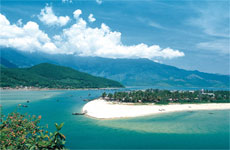Sports and Tourism Ho Tan Cuong. He said a plan, including the creation of new tourism products and cooperation
in trade promotion, human-resources training and the establishment of
representative offices in Japan, had been agreed on by the three
localities.
 The extra efforts would better meet the demands of Japanese visitors, a promising market, said the department director Dinh Hai.
The extra efforts would better meet the demands of Japanese visitors, a promising market, said the department director Dinh Hai.
These localities are home to well-known heritage sites such as Hue, Hoi An and My Son,
and special festivals like the Hue Festival, the Quang Nam Festival –
Heritage Journey and the Danang International Fireworks Festival.
However, they have failed to attract large numbers of Japanese
tourists. Out of 2.1 million foreign travellers to the three localities
last year, Japanese visitors only made up 4%.
Iijima Yukichika, former director of Yokohama Bay Sheraton
Hotel&Towers, Yokohama, Japan, emphasised the need for an adequate
understanding of the travel expectations and habits of Japanese visitors
in order to develop suitable tourism products.
Work commitments for many Japanese people could affect their travel
habits. They tended to limit their travel to a maximum of one week at a
time, said Yukichika.
Yoshiaki Noguchi, chairman of the board of HRI Institute Co, called
on stronger links among hotels and restaurants to create a greater
attraction for visitors from the entire region. Only with this
co-operation could they work to improve the quality of tourism products,
he said.
One hundred giant posters showing images of the Vietnamese
countryside and people will be hung in 45 Tokyo subway stations this
year, according to the Vietnam National Administration of Tourism
(VNAT).
Nguyen Thi Thanh Huong, Deputy Director of Department of Market under
VNAT, said that in addition to the subway ads, Vietnam would also hang a
big poster at the Vietnamese consulate in Osaka.
Vietnam welcomed about 147,000 Japanese visitors in the first four
months of this year, a 14% year on year increase, according to VNAT
statistics.